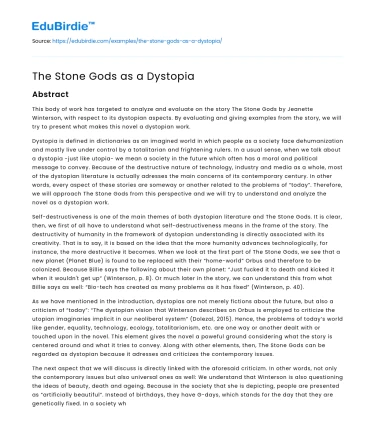Abstract
This body of work has targeted to analyze and evaluate on the story The Stone Gods by Jeanette Winterson, with respect to its dystopian aspects. By evaluating and giving examples from the story, we will try to present what makes this novel a dystopian work.
Dystopia is defined in dictionaries as an imagined world in which people as a society face dehumanization and mostly live under control by a totalitarian and frightening rulers. In a usual sense, when we talk about a dystopia -just like utopia- we mean a society in the future which often has a moral and political message to convey. Because of the destructive nature of technology, industry and media as a whole, most of the dystopian literature is actually adresses the main concerns of its contemporary century. In other words, every aspect of these stories are someway or another related to the problems of “today”. Therefore, we will approach The Stone Gods from this perspective and we will try to understand and analyze the novel as a dystopian work.
Save your time!
We can take care of your essay
- Proper editing and formatting
- Free revision, title page, and bibliography
- Flexible prices and money-back guarantee
Self-destructiveness is one of the main themes of both dystopian literature and The Stone Gods. It is clear, then, we first of all have to understand what self-destructiveness means in the frame of the story. The destructivity of humanity in the framework of dystopian understanding is directly associated with its creativity. That is to say, it is based on the idea that the more humanity advances technologically, for instance, the more destructive it becomes. When we look at the first part of The Stone Gods, we see that a new planet (Planet Blue) is found to be replaced with their “home-world” Orbus and therefore to be colonized. Because Billie says the following about their own planet: “Just fucked it to death and kicked it when it wouldn't get up” (Winterson, p. 8). Or much later in the story, we can understand this from what Billie says as well: “Bio-tech has created as many problems as it has fixed” (Winterson, p. 40).
As we have mentioned in the introduction, dystopias are not merely fictions about the future, but also a criticism of “today”: “The dystopian vision that Winterson describes on Orbus is employed to criticize the utopian imaginaries implicit in our neoliberal system” (Dolezal, 2015). Hence, the problems of today’s world like gender, equality, technology, ecology, totalitarianism, etc. are one way or another dealt with or touched upon in the novel. This element gives the novel a poweful ground considering what the story is centered around and what it tries to convey. Along with other elements, then, The Stone Gods can be regarded as dystopian because it adresses and criticizes the contemporary issues.
The next aspect that we will discuss is directly linked with the aforesaid criticizm. In other words, not only the contemporary issues but also universal ones as well: We understand that Winterson is also questioning the ideas of beauty, death and ageing. Because in the society that she is depicting, people are presented as “artificially beautiful”. Instead of birthdays, they have G-days, which stands for the day that they are genetically fixed. In a society where there is no ageing or death, it is quite reasonable to assume that things will go wrong. Consequently, in this novel, we see this resulting in sexual perversion and pedophilia, which is presented with graphic details and strong depictions.
Furthermore, the term “robo-sapiens” in itself and what they represent in the novel indicates to a futuristic yet dystopian depiction in The Stone Gods. In other words, dehumanization of people and people becoming like machines is the next dystopian aspect that we will discuss. This topic, of course, is directly connected with other elements like gender and technology. That is why, for instance, the character Spike who is a “robo-sapien”, says, “Gender is a human concept and not interesting” (Winterson, p. 64). “Robo-sapiens” can be seen as a highly developed human in the case of Spike. Spike, unlike others, undergoes an evolution which gets it closer and closer to a real human beling. Altough created to be a typical futuristic robot, it can feel and have emotions. And in the same way… “Man in Orbus is regarded as a machine rather than a living organism and his bodily parts can be enhanced” (Antakyalioglu, 2012). But nevertheless, both the role of “robo-sapiens”, the way in which they are portrayed and their relationship with humans are portrayed in a pessimistic way.
In conclusion, we can say that Winterson presents alternatives in matters such as gender relations, the seemingly inevitable consequences of technology and ecology as well as the concept of history within this frame. In light of all the aspects that can be accepted as dystopian, we also asserted that -just like most of the dystopian literature does- Winterson aims to criticize and therefore convey a didactic message concerning the contemporary problems. Along with these, she also opens up a discussion for what the possible future dilemmas might be. Considering what has been presented throughout this paper, we can read The Stone Gods as a dystopian novel.
Works Cited
- Winterson, J. (2008). The Stone Gods. Knopf Canada. Retrieved from https://book4you.org/book/1312275/1a7eab
- Dolezal, L. (2015). The Body, Gender, and Biotechnology in Jeanette Winterson’s The Stone Gods. Literature and Medicine 33(1), 91-112. doi:10.1353/lm.2015.0012.
- Antakyalioglu, Z. (2012). Jeanette Winterson’s The Stone Gods: A Postmodern Warning. Gaziantep University Journal of Social Sciences.
- Jennings, H. (2010). 'A Repeating World': Redeeming the Past and Future in the Utopian Dystopia of Jeanette Winterson's The Stone Gods. Interdisciplinary Humanities, 27 (2), 132-146.
- https://corescholar.libraries.wright.edu/english/191






 Stuck on your essay?
Stuck on your essay?

